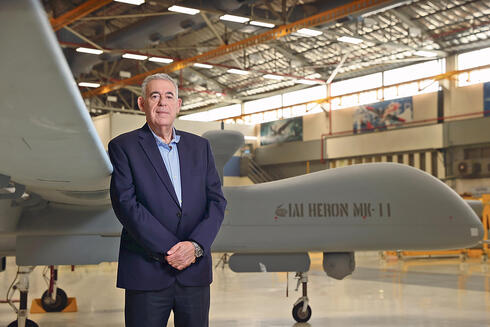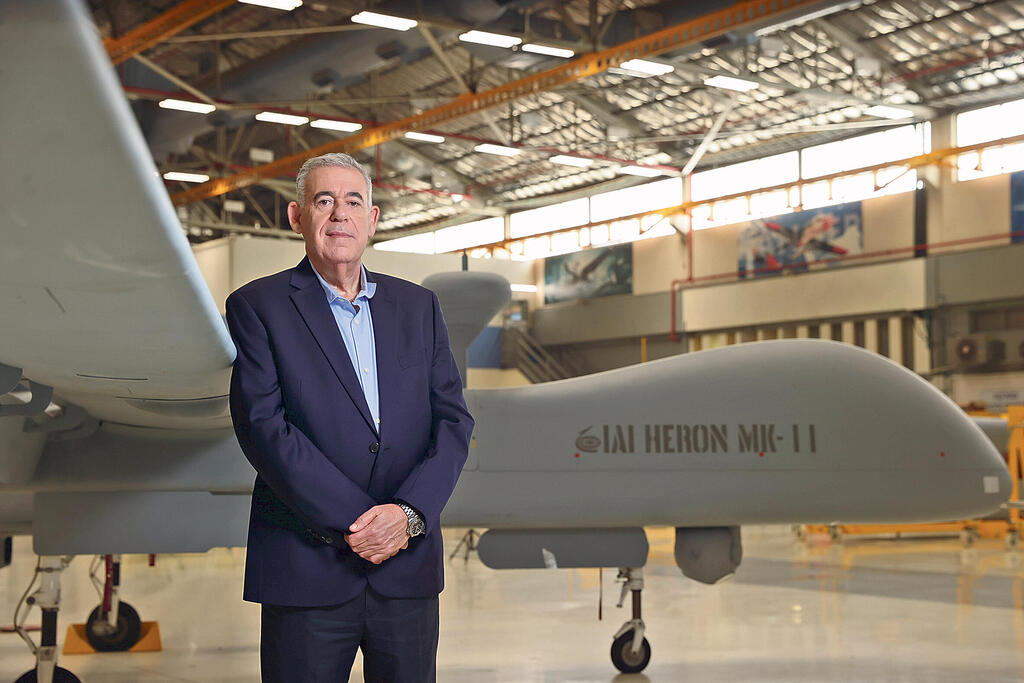
InterviewFrom Arrow 4 to laser interceptors: Israel's air defense is about to level up
Interview
From Arrow 4 to laser interceptors: Israel's air defense is about to level up
"Without the arrow missiles that shot down the ballistic missiles, the night of the Iranian attack would have ended very badly,” Israel Aerospace Industries CEO Boaz Levy told Calcalist
In the nerve-wracking days between the direct, first, and unprecedented Iranian attack on Israel and the accelerated preparation of the IDF for the promised counter-strike, Israel Aerospace Industries CEO Boaz Levy observed the regional escalation with mixed feelings. On the one hand, on that fateful night all the fears of every Israeli and the anxiety about the "Iranian threat" came true. On the other hand, Israeli technology did not disappoint, and the Arrow missiles that the IAI develops and manufactures provided an impressive interception demonstration against most of Iran's ballistic missiles that were on their way to destroy the air force base in Nevatim.
You should be pleased, right?
"I'm satisfied, of course. But I'm not ashamed of it, and I also really don't like the fact that we've come to this situation. So yes, for more than 30 years we've worked here on a defensive system that is probably the best in the world, it has proven itself in a phenomenal way, and all this tremendous effort was displayed in one successful and dramatic night."
So what's the problem?
"That this is not going to be a story of one night, but of a period. Unfortunately, this is something that will continue. Even if I am happy about the technological success, that at the operative level we were able to reach interception rates that have no precedent in history, I am not happy that we got to this situation, and I have mixed feelings. Since the beginning of the week, people I don't even know come up to me, asking to shake hands and say thank you to IAI. They tell me that they were on alert, alarmed, scared, and then they saw this display of capabilities and realized that Israel has a power that they were not aware of, and it's exciting."
Have you ever thought about how the night of missiles and UAVs that Iran arranged for us could have ended if there were no Arrow missiles?
"Yes, and I think this night would have ended differently - very badly. Unlike UAVs and cruise missiles that can be intercepted with a wide variety of means, including fighter planes that can launch missiles, with ballistic missiles, this is a completely different game."
Explain.
"A ballistic missile has a trajectory in which at the beginning it climbs at a tremendous speed into the atmosphere and returns from there to the target at a very high speed. When you discover it, it can be late and by the time you manage to advance some move to intercept it, it has already hit the ground. A great many people understood only last week the significance of the enormous speeds we are talking about. If a UAV takes 9 hours to reach Israel from Iran, a ballistic missile takes only 12 minutes, and from the moment we discover it it's even less."
What speeds are we talking about?
"Several kilometers per second. Very serious speeds. It's faster than a bullet fired from an M-16 rifle. And think about the operators in the air defense system who have to handle many such targets at the same time in order to achieve optimal interception capability. And they knew how to do it in an amazing way."
If I told you two weeks ago that your missiles would have to deal with a scenario of so many targets of all kinds, at different speeds and altitudes at the same time?
"If you had told me that this is what would happen, I would have sent you to a psychiatrist. Absolutely."
"We experienced failure after failure"
Levy (62), an aeronautics and space engineer by training, has been working in the IAI for 35 years. He was appointed the company's CEO in 2021, before that serving as the General Manager and Executive VP of IAI's Systems, Missiles & Space Group. Even before that, he was a key contributor in the planning and development teams of the Arrow. He was, among other things, the chief engineer of the unique defense system, and in the late nineties, when he was already managing the company's Arrow program, the first interceptor missiles were delivered for operational use in the Air Force.
"The beginning was not easy," he says, "we worked on Arrow 1, which was a research missile, which was never intended to be operational. We experienced failure after failure there, when we have no reference in this field because no company before IAI was developing such a system. There were problems with materials heating up which led to all kinds of malfunctions. After the third experiment, the successes came and we proved that it is possible to intercept at enormous speeds and heights, like a ball hitting a ball at enormous speeds."
While the Arrow missiles are intercepting missiles launched by the Iranians and the Houthis, you are working on the development of the Arrow 4.
"Arrow 4 is in advanced and accelerated development. This does not mean that it cannot be accelerated even more, it does not mean that we should not push further because the need for it is clear."
Would it have helped in the night the Iranians attacked?
"No, because Arrow 2 and Arrow 3 gave a good and satisfactory answer, but in the totality of the threats and looking to the future, Arrow 4 is necessary."
What will it do that its predecessors do not?
"It will respond to threats, some of which are already here and some of which will arrive in the future. But when I build a weapon system of this type, there must be an 'overlap' between the various systems in order to provide a closed and complete response, so Arrow 2, Arrow 3 and Arrow 4 will work together and provide a very good ability against any variety of threats we are facing and will continue to face."
Can you estimate when Arrow 4 will enter operational use?
"I don't need to estimate, I know exactly when but I won't tell you."
If we are already talking about the developments of the future, where is the aerospace industry in the field of laser interception? Rafael is making huge strides in the development of the "Iron Beam" interception system, Elbit Systems is working on the development of laser interception capabilities using airborne platforms. Have you given up on this field?
"Absolutely not. We know that Rafael is leading on this issue, but we are also developing laser systems and look at this issue in a slightly different way. There are very specific threats where lasers can be very helpful and our development can be integrated into the multi-layered defense system that the Ministry of Defense has built over the years, which, in my opinion, after the war should be called the multi-sectoral and multi-layered defense formation."
Is there an IAI laser system that will be integrated into this system in the near future?
"Definitely. There will be a product and it won't take a very long time. It will be a few years."
What is it supposed to intercept?
"It needs to hit the threats that arrive in large quantities in such a way that it intercepts them all, facilitates the armament of other systems and allows them to deal with other threats, such as long-range missiles and rockets."
Does this product have a name?
"Not yet."
Have field tests taken place yet?
"Partially."
Was there any interception in one of these experiments?
"Not yet.”
Reaping the benefits of demand for defense systems
Regardless of the performance of the Arrow missiles during the current war, these are good years for the aerospace industry. It ended 2023 with a record in sales and net profit. Its sales last year amounted to about $5.4 billion and its net profit was estimated at about $320 million.
One of the main reasons for the big jump, which is also evident in the performance of competitors Elbit Systems and Rafael, is the wave of global demand for weapons due to the Russia-Ukraine war. The war, which began in February 2022, has sparked an arms since not seen since the days of the Cold War, and militaries in Europe, fearing the whims of Russian President Vladimir Putin, are rushing to renew their arsenal of weapons with an emphasis on new air defense systems.
A week before the Hamas terrorist attack that led to the war, a historic deal was signed which will see the IAI supply Germany with the Arrow 3 system for approximately NIS 14 billion. This is the largest security deal in the country's history and the first deal in which Israel exports missiles. Levy says that the company's record performance last year does not yet reflect the jump in its sales to the Israeli market and these will be reflected in the company's next reports. "I predict that the upward trend in our sales will also continue in 2024 because we continue to sign large contracts in the world and on the other hand, there is a war in Israel and it is no secret that we need to replenish stocks and there is an increase in demand and we are working around the clock."
All this is still going on since October 7?
"Yes, all of this happened when 2,000 of our employees were called to the reserves at the beginning of the war and the volume of work only increased. So we began to recruit retirees, transfer employees who are less busy to the busier lines and began working 24 hours a day, seven days a week."














